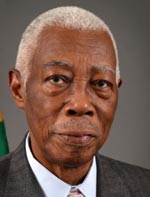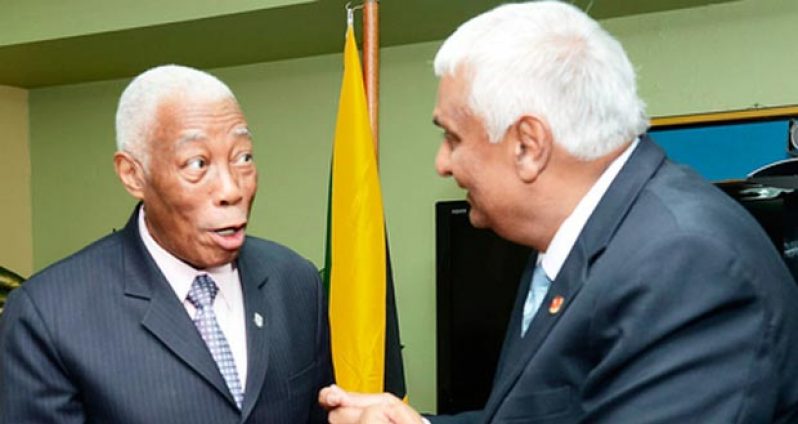–The case of two Cabinet colleagues
IN SHARP contrast to media reports and images of the public relations choreography between the Foreign Ministers of Jamaica (Arnold Nicholson) and Trinidad and Tobago’s Winston Dookeran over two days of meetings and a shared press conference in Kingston last week, political problems appeared to be brewing in Port-of-Spain as this column was being written, with a likely casualty being that country’s Minister of National Security, Gary Griffith.

Betraying a surprising lack of political maturity as a cabinet minister with impressive academic qualifications, who had previously served as personal security adviser to Prime Minister Kamla Persad-Bissessar, Senator Griffith went public last Wednesday with a sharp rebuke of Foreign Minister Dookeran for an engagement with his Jamaican counterpart “without first consulting me…”
According to Senator Griffith, the circumstances that resulted in the hurriedly arranged meeting between Foreign Ministers Nicholson and Dookeran in Kingston — at the invitation of the former — had much more to do with matters pertaining to national/regional security than a threatened trade war between Jamaica and Trinidad and Tobago. Hence, his undisguised displeasure that Dookeran had failed to have prior consultation with HIM before flying off to meet with Jamaica’s Nicholson.

Seemingly angry at not being personally involved in the Kingston meeting, Minister Griffith opted to make his media intervention — via the ‘Trinidad Guardian’ — without bothering to wait for Prime Minister Persad-Bissessar’s regular Cabinet meeting on Thursday; or without seeking to benefit from the “agreed minutes” of the Nicholson/Dookeran meeting that, according to reliable reports, could prove quite productive, with new initiatives to avoid conflict over bilateral trade, as well as recurring immigration problems for CARICOM nationals seeking entry into T&T.
It is the informed understanding of this columnist that the minutes reflect a mutual desire to ensure arrangements are in place, including frequent consultations, at ministerial and technical levels, on pertinent trade, economic, immigration, labour-related and security matters, consistent with the pursuit of serious efforts to improve and strengthen relations between Jamaica and Trinidad and Tobago.
Issues addressed

Among the specific issues addressed were hassle-free movement of Jamaicans into Trinidad and Tobago, and, relatedly, implications of the Caribbean Court of Justice (CCJ) ruling involving Barbados and the Jamaican national, Shanique Myrie.
In this context, the meeting reportedly benefited from a November 29 meeting of CARICOM’s Legal Affairs Committee (LAC) in relation to the implications of the CCJ’s judgment.
Recognition was also given to the appeals process, as raised by the CCJ, involving aggrieved CARICOM nationals, in general, who are denied entry by any member state of the Community.
Improved cooperation between Jamaica and Trinidad and Tobago immigration authorities were also discussed, with a commitment for direct involvement, as necessary, with relevant ministries of National Security, Foreign Affairs, as well as diplomatic missions.
Mutual satisfaction with the outcome of their meeting — described by Minister Dookeran at a media briefing as “quite extraordinary” — was to result in an agreement to have a similar second round of consultations, this time in Port-of-Spain, during the first quarter of next year.
Both Nicholson and Dookeran had moved with alacrity to discourage any initiative for an organised trade boycott, conscious as they are of the inter-dependence of their national economies, and the burden of legal implications for violating the CARICOM treaty that guarantees free trade in commodities clearly identified as originating from a partner state.
Required commitment
Question of relevance is whether not only Jamaica and Trinidad and Tobago, but ALL member countries of CARICOM would now better demonstrate the required commitment to protect not just treaty-based rights to free trade and services, but also reveal firm commitment to upholding the fundamental rights of Community citizens to hassle-free intra-regional travel and, consequently, curb the awful, distressing experiences of nationals from partner states being humiliated and deported from ports of entry.
In relation to the likely political fallout over National Security Minister Griffith’s public disagreement with his Foreign Affairs colleague for not “consulting” him prior to travelling to Jamaica, he should perhaps reflect on a few basic points and temper his grievance.
First, following apparent private consultations at the Prime Ministerial level between Jamaica’s Portia Simpson-Miller and T&T’s Persad-Bissessar, Foreign Minister Nicholson formally invited his Trinidadian counterpart, Dookeran, to an urgent meeting in Kingston.
Amid then prevailing emotional calls for a boycott of trade with T&T, Prime Minister Persad-Bissessar advised her Foreign Minister to accept Nicholson’s invitation and prepare for serious dialogue, since the issues involved could, and should, be sensibly resolved in the interest of strengthened relations.
Surely, Minister Griffith would have been aware of these developments and shared anxieties by administrations and corporate entities in Kingston and Port-of-Spain to diffuse conflicts in favour of sensible, mutually satisfactory relations between these two major partners of CARICOM.
And why go public with his surprising verbal swipe at his ministerial colleague, one of the more experienced and influential ministers of the People Partnership administration, without, it seems, first communicating with his Prime Minister?
Interestingly, by Friday (Dec.6), Mr. Griffith was revealing an apparent political u-turn in an interview, this time with the Trinidad Express, claiming that his comments should not be viewed as a personal conflict with his Foreign Minister colleague.
Having earlier boastfully told the ‘Guardian’ about “sending my Chief Immigration Officer” (note the personal pronoun) to accompany Dookeran to Jamaica, Griffith was telling the Express on Friday that both he and his Foreign Minister colleague had their respective responsibilities.
“One must not in any way water down the other… Any changes in operational procedure at the Immigration Department must come from the Minister of National Security, or through the National Security Council…”
And, apparently obsessed with his powers as Minister of National Security, and passion for use of the personal pronoun, Minister Griffith spoke with defiance:
“At this time,” he declared, “I have absolutely no intention whatsoever of taking down the operational procedure that we presently have in Immigration… Entry by CARICOM nationals into Trinidad and Tobago is not automatic…”
Whatever may be the problems or difficulties confronting him as Minister of National Security, Mr Griffith should at least sensitise himself to, among other relevant documents, the landmark judgment of the CCJ in the case involving Shanique Myrie and Barbados’ immigration authorities; the revised CARICOM treaty governing the single market and economy arrangements (CSME); as well as the Treaty that established the CCJ as a court of last resort for participating member states that include Trinidad and Tobago.
In all of this, there lurks the teasing question for Minister Griffith: Is there more in the mortar than the proverbial pestle? Readers should stay tuned.
(by Rickey Singh)



.jpg)








